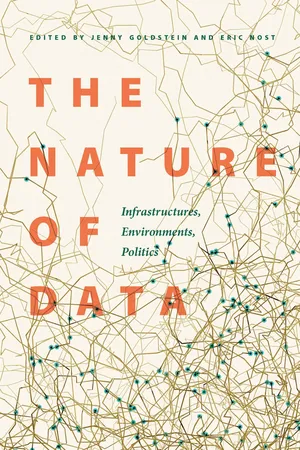
- 356 pages
- English
- ePUB (mobile friendly)
- Available on iOS & Android
About this book
When we look at some of the most pressing issues in environmental politics today, it is hard to avoid data technologies. Big data, artificial intelligence, and data dashboards all promise "revolutionary" advances in the speed and scale at which governments, corporations, conservationists, and even individuals can respond to environmental challenges. By bringing together scholars from geography, anthropology, science and technology studies, and ecology, The Nature of Data explores how the digital realm is a significant site in which environmental politics are waged. This collection as a whole makes the argument that we cannot fully understand the current conjuncture in critical, global environmental politics without understanding the role of data platforms, devices, standards, and institutions. In particular, The Nature of Data addresses the contested practices of making and maintaining data infrastructure, the imaginaries produced by data infrastructures, the relations between state and civil society that data infrastructure reworks, and the conditions under which technology can further socio-ecological justice instead of re-entrenching state and capitalist power. This innovative volume presents some of the first research in this new but rapidly growing subfield that addresses the role of data infrastructures in critical environmental politics.
Frequently asked questions
- Essential is ideal for learners and professionals who enjoy exploring a wide range of subjects. Access the Essential Library with 800,000+ trusted titles and best-sellers across business, personal growth, and the humanities. Includes unlimited reading time and Standard Read Aloud voice.
- Complete: Perfect for advanced learners and researchers needing full, unrestricted access. Unlock 1.4M+ books across hundreds of subjects, including academic and specialized titles. The Complete Plan also includes advanced features like Premium Read Aloud and Research Assistant.
Please note we cannot support devices running on iOS 13 and Android 7 or earlier. Learn more about using the app.
Information
Table of contents
- Cover
- Title Page
- Copyright Page
- Contents
- List of Illustrations
- List of Tables
- Introduction
- Part 1
- 1. Data’s Metropolis
- 2. An Emerging Satellite Ecosystem and the Changing Political Economy of Remote Sensing
- 3. Smart Earth
- 4. Data, Colonialism, and the Transformation of Nature in the Pacific Northwest
- Part 2
- 5. Environmental Sensing Infrastructures and Just Good Enough Data
- 6. Collaborative Modeling as Sociotechnical Data Infrastructure in Rural Zimbabwe
- 7. Citizen Scientists and Conservation in the Anthropocene: From Monitoring to Making Coral
- 8. Data Infrastructures, Indigenous Knowledge, and Environmental Observing in the Arctic
- 9. Digital Infrastructure and the Affective Nature of Value in Belize
- 10. Infrastructuring Environmental Data Justice
- Part 3
- 11. “A Poverty of Data”?
- 12. Illicit Digital Environments
- 13. Data Gaps
- 14. Data Structures, Indigenous Ontologies, and Hydropower in the U.S. Northwest
- 15. How Forest Became Data
- Conclusion
- Source Acknowledgments
- Contributors
- Index
- About Jenny Goldstein
- About Eric Nost